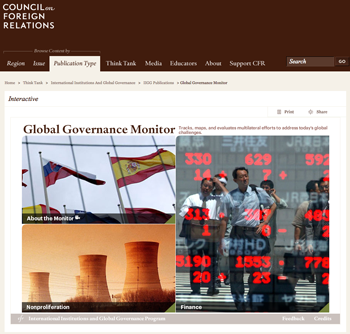 The Council on Foreign Relations, in collaboration with MediaStorm, has launched the second section of their Global Governance Monitor, an in-depth look at multilateral responses to today’s pressing global challenges.
The Council on Foreign Relations, in collaboration with MediaStorm, has launched the second section of their Global Governance Monitor, an in-depth look at multilateral responses to today’s pressing global challenges.
Finance looks at the world’s economy through time, from the Bretton Woods Agreements in 1944 to today. Incorporating a map, an interactive timeline, and a comprehensive overview, the Global Governance Monitor aims to shed light on our economic history, providing information as we lead up to the G20 summit.
The Program on International Institutions and Global Governance (IIGG) at the Council on Foreign Relations (CFR) aims to identify the institutional requirements for effective multilateral cooperation in the twenty-first century. The program is motivated by recognition that the architecture of global governance-largely reflecting the world as it existed in 1945-has not kept pace with fundamental changes in the international system.
These shifts include the spread of transnational challenges, the rise of new powers, and the mounting influence of nonstate actors. Existing multilateral arrangements thus provide an inadequate foundation for addressing many of today’s most pressing threats and opportunities and for advancing U.S. national and broader global interests.
Given these trends, U.S. policymakers and other interested actors require rigorous, independent analysis of current structures of multilateral cooperation, and of the promises and pitfalls of alternative institutional arrangements. The IIGG program meets these needs by analyzing the strengths and weaknesses of existing multilateral institutions and proposing reforms tailored to new international circumstances.
